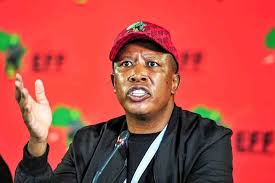By Hassan Osman Kargbo
South African opposition politician Julius Malema, leader of the Economic Freedom Fighters (EFF), has been found guilty of illegal possession of a firearm and discharging it in public, offences that carry a minimum sentence of 15 years in prison.
The ruling follows a long-running case dating back to 2018, when a widely circulated video showed Malema firing several shots into the air during the EFF’s fifth anniversary celebrations in the Eastern Cape province. The event, held before thousands of supporters, was meant to be a show of political strength but has now returned to haunt the outspoken leader.
Malema faced the charges alongside his former bodyguard, Adriaan Snyman, who had been accused of handing him the semi-automatic rifle used during the incident. While Snyman was acquitted of all charges, the court found Malema directly responsible for unlawfully handling and firing the firearm.
Prosecutors argued that Malema’s actions were reckless and endangered the public, setting a dangerous precedent for political leaders. They maintained that the firing of the gun in a crowded public space was not only unlawful but also a clear violation of South Africa’s firearm control laws.
Judge’s findings emphasized that Malema’s status as a political leader did not exempt him from accountability. “The rule of law must apply equally to all, regardless of their political standing,” the court noted.
The guilty verdict represents a major blow to Malema, who has built his political career on fiery rhetoric and a combative stance against the ruling African National Congress (ANC). Known for his outspoken criticism of President Cyril Ramaphosa and his calls for radical economic transformation, Malema has long styled himself as the voice of South Africa’s marginalized and poor.
His party, the EFF, has consistently defended him throughout the trial, dismissing the case as politically motivated and designed to weaken his influence. Party officials argue that the timing of the judgment raises questions about political interference, though the court has insisted that the verdict was based solely on evidence.
Legal experts say Malema could face a tough sentencing outcome, given that the offences he has been convicted of carry a minimum of 15 years in prison under South African law. However, the final decision rests with the court, which may consider mitigating factors before handing down the sentence.
Malema’s conviction is likely to send shockwaves across South Africa’s political landscape. As leader of the EFF, the country’s third-largest political party, he has a significant following, particularly among the youth. Analysts warn that the ruling could trigger political tensions, with EFF supporters expected to mobilize in solidarity.
The development also raises questions about Malema’s political future. If sentenced to a lengthy prison term, his ability to lead the EFF and participate in parliamentary activities could be severely restricted.
For now, the party has vowed to stand by its leader, while Malema’s legal team is expected to file an appeal. As the country awaits the next phase of the legal process, the conviction has underscored the principle that even high-profile politicians are not above the law in South Africa.











